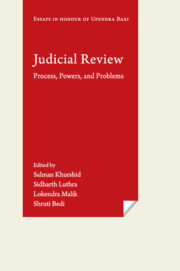Book contents
- Frontmatter
- Contents
- Foreword
- Editors' Note
- Introduction
- 1 The Inadequacy of Judicial Enforcement of Constitutional Rights Provisions to Rectify Economic Inequality, and the Inevitability of the Attempt
- 2 The Interplay of Law and Politics in India
- 3 Beating the Backlog: Reforms in Administration of Justice in India
- 4 Judicial Review: Perspectives and Reflections for the Twenty-First Century
- 5 When ‘Creeping Jurisdiction’ Goes Awry: The Social Action Litigation to Ban Surrogacy
- 6 Judicial Review and the Democratic Judge
- 7 Judicial Review: A Tool to Shape Constitutional Jurisprudence
- 8 The Baxian Bioscope on Indian Judicial Process
- 9 Judicial Activism, Courts, and Constitutional Revolutions: The Israeli Case
- 10 Democracy, Constitution, and Judicial Review: A Critique
- 11 A Minor Jurisprudence of Pathos: Upendra Baxi as Teacher and Writer
- 12 The Need for Reinventing the Supreme Court as a Constitutional Court
- 13 Appointment of ‘Distinguished Jurists’ as Judges in the Supreme Court of India: A Critical Analysis
- 14 Judicial Dissent and Judicial Review: A Functional Analysis
- 15 The Power of Judicial Review: Judicial Chutzpah or Judicial Desideratum
- 16 Judicial Review of Legislations by Tribunals in India: Law, Problems, and Perspectives
- 17 Criminalization of Membership of Terrorist Organizations in India and the United States of America: Human Rights Concerns
- 18 Article 142 of the Indian Constitution: On the Thin Line between Judicial Activism and Restraint
- 19 Sketching the Limits of Article 142 of the Constitution of India: A Constitutional Necessity
- 20 Constitutional Morality and Judges of the Supreme Court
- About the Contributors
- Index
6 - Judicial Review and the Democratic Judge
Published online by Cambridge University Press: 23 January 2020
- Frontmatter
- Contents
- Foreword
- Editors' Note
- Introduction
- 1 The Inadequacy of Judicial Enforcement of Constitutional Rights Provisions to Rectify Economic Inequality, and the Inevitability of the Attempt
- 2 The Interplay of Law and Politics in India
- 3 Beating the Backlog: Reforms in Administration of Justice in India
- 4 Judicial Review: Perspectives and Reflections for the Twenty-First Century
- 5 When ‘Creeping Jurisdiction’ Goes Awry: The Social Action Litigation to Ban Surrogacy
- 6 Judicial Review and the Democratic Judge
- 7 Judicial Review: A Tool to Shape Constitutional Jurisprudence
- 8 The Baxian Bioscope on Indian Judicial Process
- 9 Judicial Activism, Courts, and Constitutional Revolutions: The Israeli Case
- 10 Democracy, Constitution, and Judicial Review: A Critique
- 11 A Minor Jurisprudence of Pathos: Upendra Baxi as Teacher and Writer
- 12 The Need for Reinventing the Supreme Court as a Constitutional Court
- 13 Appointment of ‘Distinguished Jurists’ as Judges in the Supreme Court of India: A Critical Analysis
- 14 Judicial Dissent and Judicial Review: A Functional Analysis
- 15 The Power of Judicial Review: Judicial Chutzpah or Judicial Desideratum
- 16 Judicial Review of Legislations by Tribunals in India: Law, Problems, and Perspectives
- 17 Criminalization of Membership of Terrorist Organizations in India and the United States of America: Human Rights Concerns
- 18 Article 142 of the Indian Constitution: On the Thin Line between Judicial Activism and Restraint
- 19 Sketching the Limits of Article 142 of the Constitution of India: A Constitutional Necessity
- 20 Constitutional Morality and Judges of the Supreme Court
- About the Contributors
- Index
Summary
I have argued elsewhere that there are four basic types of judicial review of legislation currently operating in different jurisdictions: strong and weak judicial review, and strong and weak basic structure review. In this chapter, I will provide an account of the role of a ‘democratic judge’ operating under each of these types. A democratic judge, under this perspective, is not a judge that puts majority preferences above constitutional rights, but one that is particularly attentive to the relative finality of her decisions. I will argue that when determining whether to issue a declaration of invalidity in a hard case, a democratic judge would consider the institutional and cultural factors that directly or indirectly influence the difficulty of amending the constitution under which she operates. Conversely, in systems where judges only have the power to issue declarations of inconsistency, a democratic judge would attempt to ensure that her judgments inform ordinary citizens that a rights-inconsistent law has been adopted by the legislature, and to present legislative majorities with arguments that lead them to reconsider whether the relevant law should remain valid. Democratic judges, I will argue, need to be aware that although the different forms of judicial review come accompanied by their own democratic justifications, they are susceptible to different (anti-democratic) pathologies that may render those justifications inapplicable.
The chapter proceeds in the following way. The first section introduces the four types of judicial review. Each type, it will be seen, rests in a different conception of the relationship between courts, legislatures, and ‘the people’ (understood here as those individuals who are represented by the legislature). From a formal perspective, what determines the ‘strength’ of a system of strong judicial review of legislation is the relative finality of a judicial finding of unconstitutionality. Such finality largely depends on the institutional possibilities of a legislative or popular response to the decision at issue (for example, a constitutional amendment). The second section of the chapter begins by considering the ways in which each of the four types of judicial review can be justified from a democratic perspective. These justifications, it will be argued, do not always work, as there are factors that affect the relative finality (and the practical effects) of a judicial declaration of invalidity or of inconsistency, and therefore their susceptibility of being overridden.
- Type
- Chapter
- Information
- Judicial Review , pp. 107 - 126Publisher: Cambridge University PressPrint publication year: 2020



